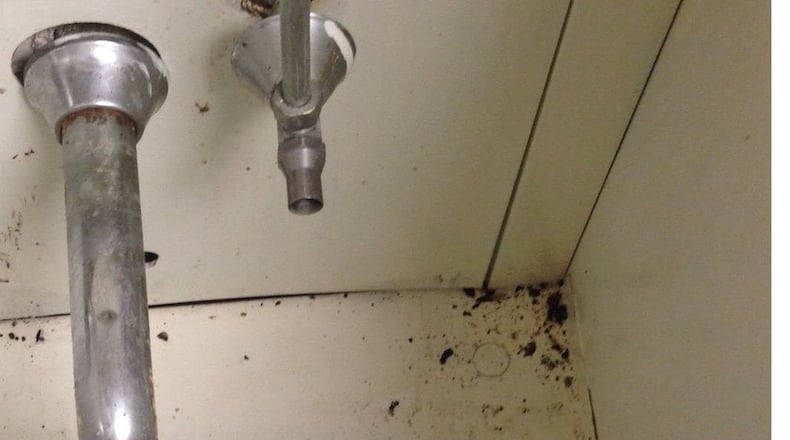The unsafe and unsanitary conditions at Georgia’s flagship prison medical facility are worse than previously reported and could jeopardize the health of inmates already dealing with cancer and other serious illnesses, newly obtained photos and documents reveal.
Photos obtained by The Atlanta Journal-Constitution in the last two weeks show standing water and filth from leaking ceilings only feet away from the operating room, pads on the floor to soak up leaking rain water and air vents covered with dust and other debris at Augusta State Medical Prison.
The AJC has also obtained recent letters and emails in which two inmates diagnosed with cancer described broken and dirty toilets and showers as well as other germ-related issues in the dormitories where they were required to recover after surgery. Both inmates said they found the place so unsanitary that they would resist further treatment if they had to have it there.
The photos and the conditions described by the inmates suggest that problems at the Grovetown facility, revealed publicly for the first time in an AJC article last month, make it a breeding ground for infection and that patients are being directly affected.
The photos showing the impact of water damage raise particular questions. When such a problem is allowed to persist, it can lead to bacteria, parasites and other issues that are especially harmful for people with compromised immune systems.
"When you let standing water hang around, bad things are going to happen," said Mark Sobsey, a professor in the University of North Carolina's Gillings School of Public Health who specializes in environmental matters. "There are profound health risks for people who get exposed."
Randy Sauls, the Georgia Department of Corrections' assistant commissioner for health services and the agency's point person in an effort to clean up the facility, did not respond to phone and email messages seeking comment for this story.
Sauls and other officials with the Department of Corrections and with Georgia Correctional HealthCare, the branch of Augusta University that provides medical services for the facility, have been in scramble mode since the AJC's initial story was published Oct. 21.
Shortly after the story appeared, officials ordered the removal of bags of garbage that had been piling up in a hallway outside the operating room. As the AJC reported, the garbage had been stored in that area for months, drawing swarms of flies and mosquitoes, even though the facility’s medical director, Dr. Mary Sherryl Alston, had vehemently complained.
The AJC’s story also prompted Sauls and two other prison system officials to visit the facility on Oct. 27. The group — which included Rose Williams, a member of the corrections board, and Ricky Myrick, the department’s assistant commissioner for facilities — looked over the building for three hours. Since the visit, an office has since been set up at the facility for Sauls’ use. Another corrections official also has been assigned to the facility, the AJC has learned.
However, it’s unclear what officials plan to do moving forward, in large measure because they have been instructed by the prison system’s statewide medical director, Dr. Sharon Lewis, to limit what they put in writing. The directive appears aimed at keeping what officials are learning about the facility out of emails and other documents that would be available to the public under the Georgia Open Records Act.
After a physician, Dr. Timothy Young, complained in an Oct. 26 email to Warden Scott Wilkes that garbage was still being stored near nursing units, Lewis wrote: “I request that nothing further be shared in writing regarding this topic. Please discuss in person.”
Later that day, Lewis wrote another email in which she implored other officials to discuss the facility’s sanitation issues during meetings “rather than use email.”
“With the recent publicity, these issues need to be resolved otherwise,” she wrote.
The state’s plans for dealing with the situation have added significance because the 34-year-old facility, while both a hospital and a prison, isn’t subject to the same level of outside scrutiny as more conventional healthcare facilities.
The hospital isn’t accredited by the Joint Commission, the nonprofit organization that accredits and certifies healthcare facilities throughout the U.S., so it isn’t subject to the commission’s patient safety standards and inspections.
It also is apparently outside the jurisdiction of the Occupational Safety and Health Administration, the federal agency that ensures workplace safety. According to an agency spokesman, OSHA only has jurisdiction for state facilities when they use workers from private companies. Because the medical areas of the prison are staffed by employees of another state institution, Augusta University, that would appear to put it beyond OSHA’s reach.
Dirt and standing water
The newly-acquired photos graphically underscore the effects of water damage near the hospital’s operating room.
One group of photos shows a sink just outside the operating room that hasn’t been repaired or apparently even cleaned since it was damaged in mid-August by water from a burst air conditioning duct. The sink, once used by doctors and nurses to wash their hands, is in an area where patients are wheeled in and out of surgery.
Among the photos is one showing the sink’s abandoned cabinet littered with dirt and a roach crawling to one side. In another, water can be seen pooling in the elbow of a severed pipe.
Other photos of the same area show a tarp diverting rain water from a leak in the roof. The photos show the tarp funneling water into a dirty, rusted drain in the floor for runoff from an ice machine.
Photos also show large absorbent pads on the floor near doors where the roof leaks when it rains. One of the doors is adjacent to the operating room.
The AJC previously reported that Augusta University’s annual environmental survey of the hospital in July found four leaking ceilings, two of which hadn’t been fixed even though they were flagged the year before. The survey also found so-called black mold in two locations and noted that the leaks likely were the cause of the fungus.
The photos recently obtained by the AJC also show two air vents spotted with dirt and other debris. One is near the operating room. The other is in a hospital clinic.
Sobsey, the University of North Carolina professor, noted that quickly repairing water damage and cleaning air vents are basic tenets for protecting immunocompromised patients, but, in truth, doing those things should be obvious.
"Think of it in your own context," he said. "Would you want your children or whomever exposed to this? Of course not. It's common sense."
‘Deporable’ conditions
The complaints from the two inmates with cancer focused largely on what they experienced after their procedures. In both instances, the inmates spoke out before the AJC first publicized the facility’s problems.
One of the men, Robert Carey Seymour, wrote in an email to his family that he would refuse radiation following his Oct. 12 surgery to remove a cancerous tumor and lymph nodes from his face if he had to undergo the treatments at Augusta State Medical Prison.
In another email, Seymour wrote that he spent 16 days in a prison dormitory recovering from his surgery, which required more than 100 stitches, and never received a clean pair of underwear or a clean T-shirt. He said he would wash his underwear in the shower at night and hope it was dry by morning.
Seymour, who is serving a life sentence for murder, said he was among 50 men living in an area where only one of its four toilets, one of six sinks and one of four showers were working.
“The overall health and security of these living units is deplorable and the staff does not seem to care,” he wrote.
The other inmate wrote an Oct. 13 letter to Sauls and other officials in which he called his three week-long stays this year at the medical prison for treatment of bladder cancer "nightmarish."
The inmate, who asked that the AJC not identify him by name due to fear of retaliation, also wrote of broken toilets, sinks and showers and described how sick inmates were forced to share a hand-held shower head.
“Men with open wounds are showering and then they have no option other than to lay the shower head on the floor where all kinds of bodily fluids and germs may be pooling,” he wrote in the typed letter, which ran 10 pages.
The inmate made it known that he, too, would rather forgo his follow-up treatment if he had to receive it at the facility.
“I know I am in prison so things just aren’t going to be all peaches and cream but this experience has gotten me thinking I will just take my chances with my health rather than going through another trip to ASMP,” he wrote.
Keep Reading
The Latest
Featured











